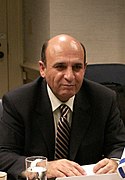Kadima leadership election, 2012
|
|
||||||||||||||||
|---|---|---|---|---|---|---|---|---|---|---|---|---|---|---|---|---|
|
||||||||||||||||
|
||||||||||||||||
|
||||||||||||||||
An election for the leadership of Kadima was held on 27 March 2012, pitting Tzipi Livni against Shaul Mofaz. Mofaz won with 62% of the vote.
In November 2011, the three candidates opposed to Tzipi Livni in 2008 called for a primary to be held as soon as possible, citing the probability of Knesset elections soon. Livni said that candidates were welcome to bring up the issue at a party meeting. Livni said in an interview that she was not interested in politics. Prior opponent Avi Dichter responded that her statement was insulting to party members. Another Kadima MK called the remarks "the opposite of prime ministerial." Livni said that candidates were welcome to bring up the issue at a party meeting. However, at the meeting Livni maneuvered to delay the primary for several months. Finally, on 19 January 2012, Livni set the primary date for 27 March 2012. A Haaretz article stated that the campaign will likely involve mudslinging and personal attacks that could further damage the party's standing.
At a campaign rally, Livni was confident and said that Kadima under her leadership was best poised to defeat the incumbent Likud under Benjamin Netanyahu. Mofaz countered that Livni was weak and he would be better able to oppose Moshe Feiglin's influence in Knesset. Dichter said that Livni has harmed the party and a new leader is needed. An 18 January Maagar poll supported Livni's claim with Kadima winning four more seats under Livni than Mofaz. However, neither could take the party to victory. Former prime minister and Kadima leader Ehud Olmert declined to endorse any candidate.
At a press conference, Mofaz said his first priority will be to ensure there is "one law for everyone". He lowered his criticism of his opponent and said he would offer her a position if he was prime minister. Citing his four decades of military service and participation in four wars, he said that he would "make the utmost effort to achieve peace with [Israel's] neighbors". He also said that non-participation in the military service was a growing problem and that Israel must reform its system of governance. Previously in support of unity, Mofaz declined to join a Netanyahu government. He was confident that he could change the course of Kadima and take it to victory.
...
Wikipedia


